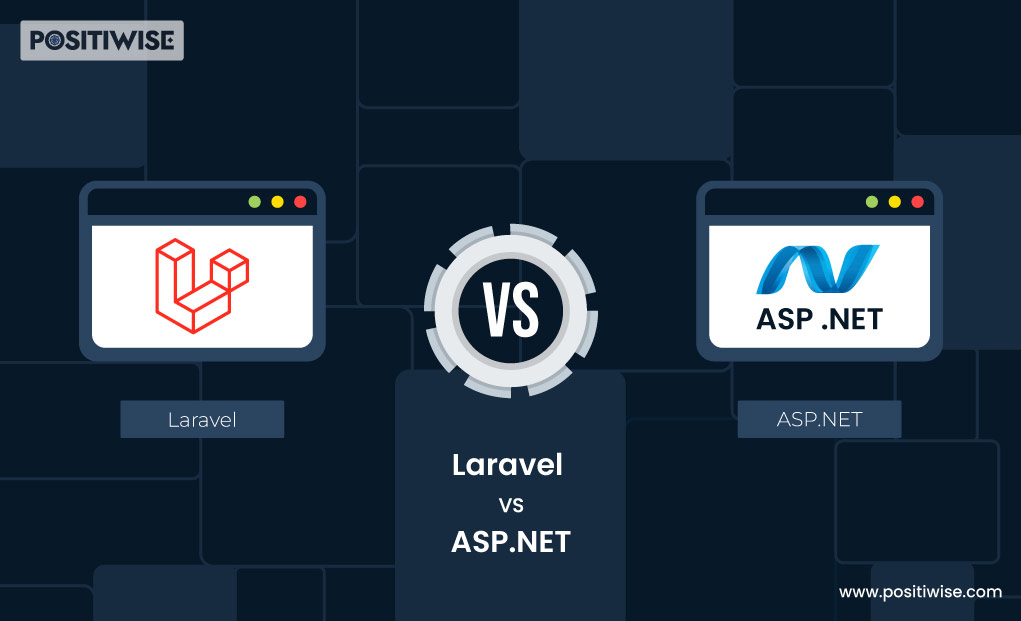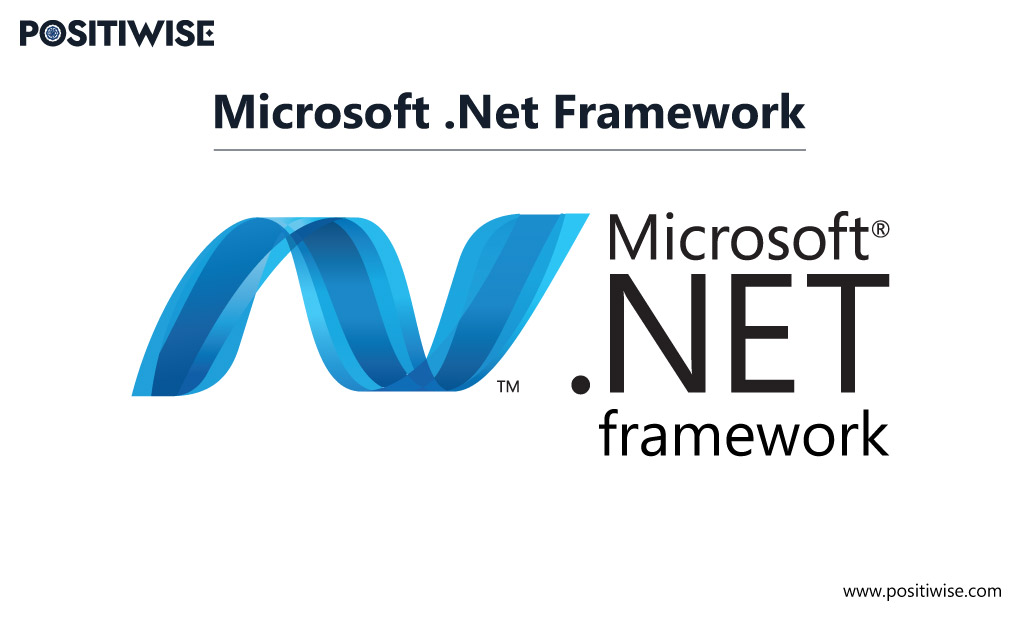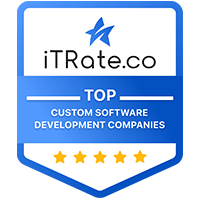Quick Overview:
Developing a web application has become a favorable choice for organizations, as it helps to save cost and time and improve the overall experience. But, when it comes to choosing a web development technology, ASP.NET and Laravel are the two that need clarification. Both frameworks can support business operations but differ in various aspects. In this blog, we have shed light on the Laravel vs ASP.NET differentiation to help you know the better framework for you. You will undergo the differentiation on the basis of all major factors, including security, performance, cost, etc.
Introduction
Every firm wants a reliable, sustainable, fast, secure, and scalable web application for their business. But, when it comes to selecting a framework, it puts everyone into deep complexities. Nowadays, even when they avail of consultation, the two frameworks are always on the list – ASP.NET and Laravel.
ASP.NET and Laravel both are quite popular. By undergoing the ASP.NET vs Laravel differentiation, you will know which is better and why.
So, let’s get started.
What is Laravel?
Laravel is a development framework from the PHP ecosystem used for creating web applications. It’s an open-source technology, and you can use it for free per your convenience and requirements.
In recent years, several large enterprises have started using Laravel for their business applications, as it uses the MVC (Model-View-Controller) architecture. The MVC benefit of Laravel helps companies to write and maintain the code effortlessly. And it also aids in separating the business logic and interface rendering for a better user experience.
In addition, it comes with various high-end built-in tools, including the following:
- Object Relational Mapper (ORM), known as Eloquent in Laravel
- Artisan (Command Line Tool for fast execution)
Pros of Using Laravel
The top benefits of using Laravel (PHP Framework) are:
- Object-oriented Laravel libraries make it easy for developers to implement logic and build an advanced application.
- The Laravel MVC architecture makes code organized and clean, leading to better app maintenance.
- The database migration feature improves collaboration; everyone can see updated information in real time.
- Eloquent ORM helps in the database configuration. It enables developers to connect databases within minutes.
Cons of Using Laravel
The disadvantages of using the Laravel web development framework are as follows:
- Due to a lack of documentation, it can be difficult for developers to debug. You need to onboard an experienced PHP developer with 6+ years of experience, which can increase your budget.
- It doesn’t offer a built-in authentication mechanism. So, you need to configure a third-party component, increasing efforts, compatibility, and security issues.
- Error and exception handling is quite complex compared to other technologies.
What is ASP.NET?
ASP.NET is also a web development framework and a product of Microsoft. It’s available free of cost and with an open-source architecture, providing complete flexibility for application development. In addition, it’s a cross-platform compatible technology. You can utilize it for curating software to run on Windows, macOS, Linux, and Docker platforms.
Furthermore, ASP.NET enables the extension of .NET functionalities by executing user requests in F# and C# languages. Also, it provides an advanced template syntax for developing dynamic web pages for improved customer satisfaction.
In addition, it has advantages with permission to use libraries associated with .NET. It also allows the creation of essential .NET libraries that can be shared between numerous .NET applications. Thus, this Microsoft development technology enables the development of cost-effective solutions promptly.
Pros of Using ASP .NET
The following are the top benefits of using ASP.NET for app development:
- ASP.NET is cross-platform compatible, helping to save money, as you only need to develop a single codebase.
- It helps to save time due to the building of a single source code for all significant operating systems.
- It offers a built-in authentication mechanism for better security and preventing illegitimate actors.
- You get security patches and updates from Microsoft.
- Enable developers to discover errors and exceptions before compilation.
- Leverages to use the language of your choice – C#, F#, or Visual Basic.
Cons of Using ASP .NET
Below are the primary disadvantages of using the ASP.NET framework:
- ASP.NET applications require Windows-based servers, which can be expensive.
- Learning ASP.NET is pretty complex compared to Laravel and other technologies.
- The debugging and maintenance can become arduous if you don’t hire dedicated ASP.NET developers.
- The licensing cost of ASP.NET can increase the budget.
- The technical support available for ASP.NET is considered ineffective.
Real Statistics of Laravel and ASP.NET Framework
Laravel Usage Statistics
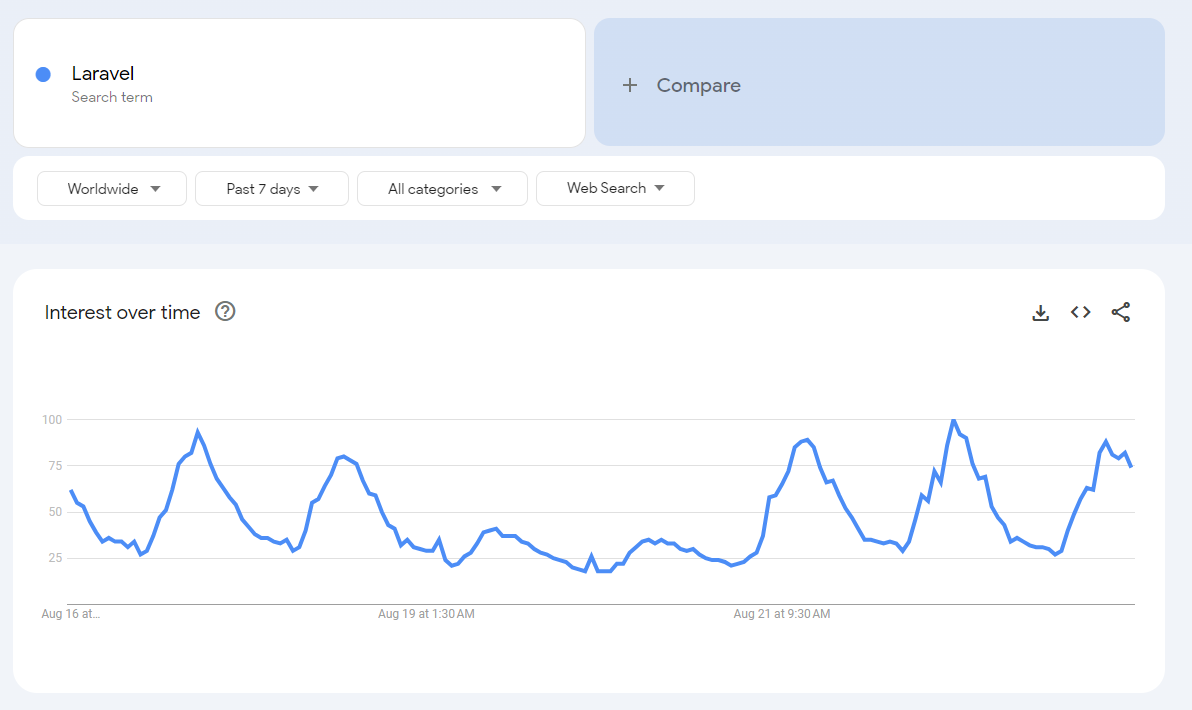
Asp.Net Usage Statistics
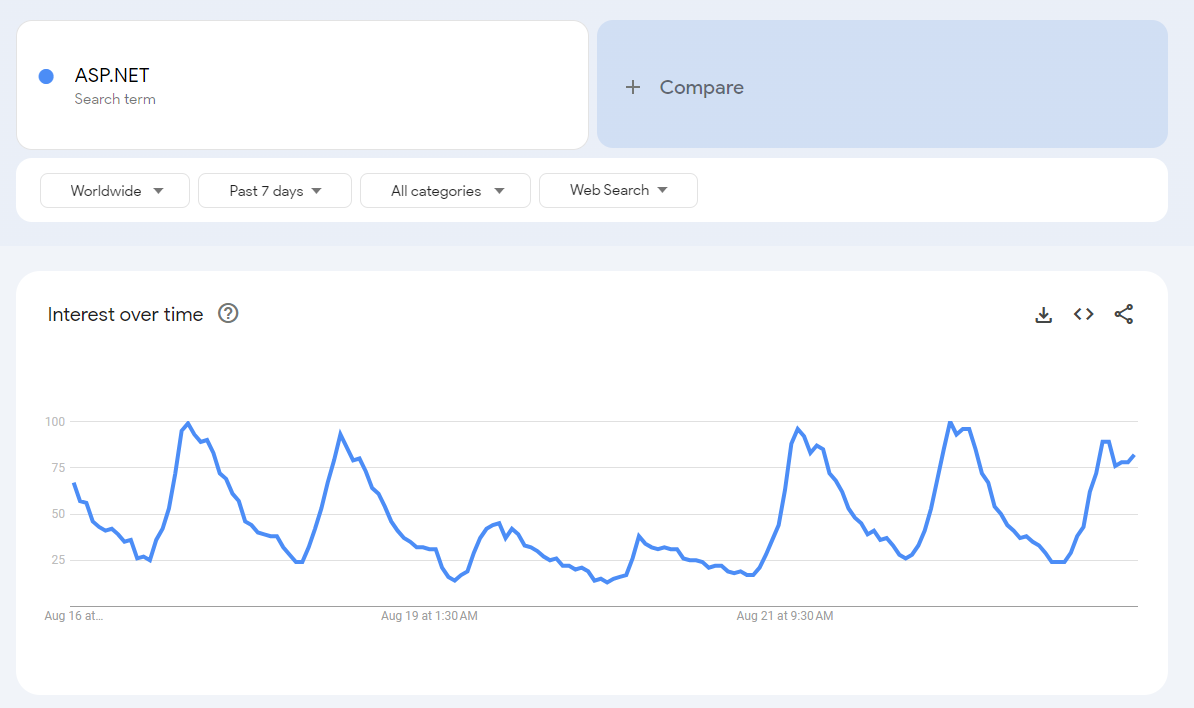
Laravel vs ASP.NET Framework: Market Share
According to the statistics provided by similartech.com, ASP.NET gets used more, as 1,494,302 applications are currently based on it. On the other hand, only 135,245 apps use Laravel, which is a difference of 1,359,057 web apps.

In addition, ASP.NET is also a top choice of companies whose web applications rank in the top 10K, 100K, and 1M series. And if we compare web apps available across the internet, ASP.NET wins.
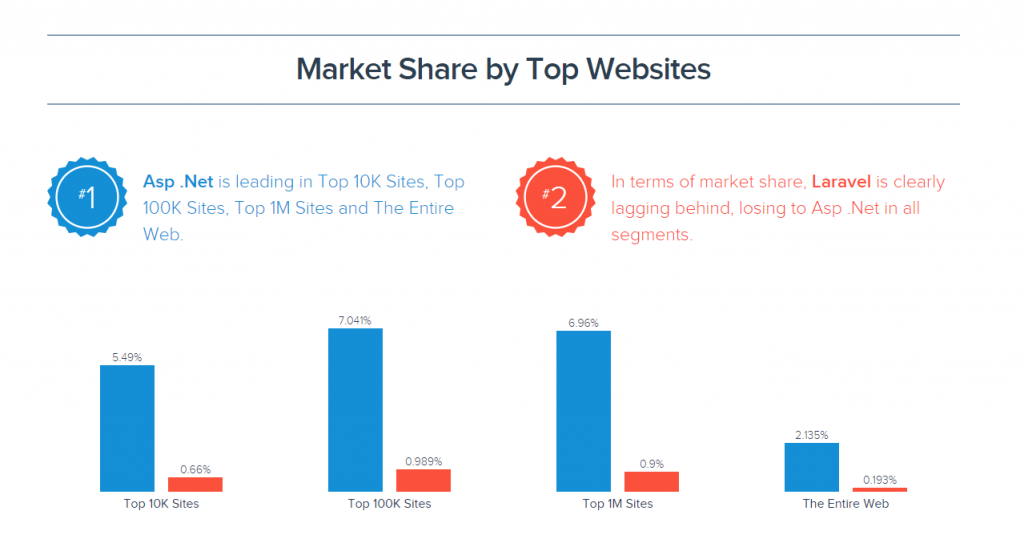
Further, ASP.NET is again a winner in the industry-specific usage comparison. Where ASP.NET is getting used for an average of 55,677 applications, Laravel is only getting preferred for an average of 2,884 apps.
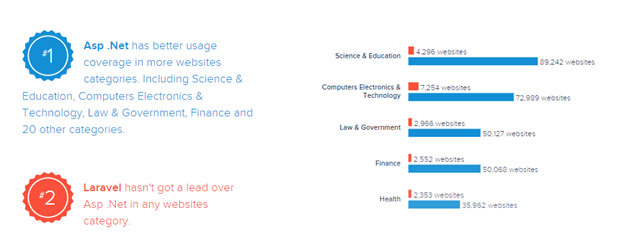
Additionally, as you can see in the following global map, the blue part is the area where ASP.NET is primarily used and considered. And the red part is where Laravel is taking an edge.
The complete geographical area is blue, so the answer is clear: ASP.NET is leading the way far.

A study by W3Techs compared the usage rates of PHP and ASP.NET for server-side web programming. The results showed that PHP is used by 77.3% of websites where the server-side language is known, while ASP.NET is only used by 6.9%.

Examining the Usage by Ranking Breakdown:
- PHP is the server-side programming language for 77.3% of all websites where the language is known.
- For websites ranking in the top 1,000,000, PHP is used by 75.8% of those where the server-side language is known.
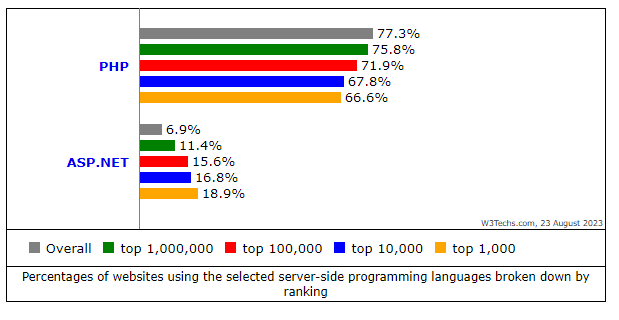
ASP.NET vs PHP (Laravel): The Metrics To Compare
We have drawn the following comparison using metrics like performance, security, scalability, resource availability, cost, and community support to get a deep insight into each development technology.
Speed and Performance: Laravel vs. ASP.NET
- The speed and performance of an application are affected by multiple factors, such as programming language and databases for web application development, server operating system, bandwidth, etc. However, only comparing development frameworks will not provide a clear insight into application speed.
- But, in ASP.NET vs Laravel, you can consider any of the development frameworks. Both frameworks work in their ecosystem and are built using different languages. You can use any technology to develop lightweight and fast-loading software for your business.
- In addition, to ensure that your app provides a high performance, you must consult with a PHP or .NET development company. They can help you with developing an authentic solution covering all your needs. Thus, Laravel and ASP.NET are pretty similar in terms of performance and speed.
Security: Laravel and ASP.NET
- Security is the primary aspect you must undergo before selecting any application development and deployment technology. It helps to determine whether the framework can retain data integrity and confidentiality.
- In the Laravel vs ASP.NET comparison, you get a different set of built-in security mechanisms. If you choose Laravel, you avail of hashing, authorization, validation, email verification, password resetting, and encryptions. In ASP.NET, you get protection from CSRF, XSS, SQL injection, form-based authentication, and code and data access security.
- Furthermore, it completely depends on your requirements to select any of the development frameworks. But remember that you can always integrate third-party mechanisms to solidify the software security.
Scalability: Laravel and .NET
- Scalability refers to the growth of applications with increasing users. If we compare ASP.NET and Laravel for scalability, they are like poles. Laravel leverages horizontal scaling, whereas ASP.NET offers vertical scaling. Both have their advantages as well as disadvantages. Vertical scaling will provide you with a lower response time due to zero synchronization.
- Also, it is considered less expensive. On the other hand, horizontal scaling will aid in optimizing fault tolerance and elasticity within the cost constraint. At some point, Laravel wins in terms of scalability. But, again, it will solely depend on your project requirements.
Resource Availability: Laravel vs ASP.NET
- Finding appropriate resources, such as developers, IDEs, testing tools, and compatible deployment servers, must be your priority while choosing between frameworks. Whether you choose ASP.NET or Laravel, you can easily find developers for both. However, ASP.NET professionals are quite affordable than Laravel developers.
- Also, the tools available for both frameworks are effortlessly accessible to everyone. But, in the aspect of documentation, Laravel needs to improve to some extent. Microsoft provides full-fledged ASP.NET documentation on its official website, covering every component’s functioning, implementation, and troubleshooting.
Thus, ASP.NET takes an edge in the resource availability aspect.
Development and Maintenance Costs of ASP.NET and Laravel
In terms of development and maintenance costs, Laravel and ASP.NET balance each other.
- Laravel is completely free to download and use, whereas for ASP.NET, you need to pay a monthly hosting charge. But you can download it for free from the Microsoft website. And when it comes to hiring developers for each technology, Laravel is more expensive than ASP.NET.
- You can find experienced ASP.NET developers for US$ 35 to 65 on an hourly basis. On the other hand, experienced Laravel developers are available for a US$ 38 to 75 per hour rate. However, if you find a PHP or .NET development company outsourcing their services, the pricing can come down for both.
Community Support: ASP.NET and Laravel
- Whether it’s ASP.NET or Laravel, a community of both technologies is highly supportive. You can find hundreds of forums and discussion boards where you can ask a query to get an instant response. Also, you can participate in the forums by providing answers to other people’s questions. It will help you make connections and widen your network.
- Therefore, you will get strong community support for Laravel and ASP.NET development frameworks.
- ASP.NET is a secure platform with built-in features for protection against common vulnerabilities, and it integrates with Microsoft’s products for regular updates and patches.
- Laravel, on the other hand, provides security measures but not as comprehensive as ASP.NET. Laravel developers must be cautious and use third-party packages for some security aspects.
Project Size: Laravel vs. ASP.NET
- Laravel is suited for small to medium-sized projects, offering a lightweight and agile approach to development. It is a flawless choice for startups and smaller businesses looking for rapid development and deployment.
- ASP.NET, with its extensive set of tools and capabilities, shines in larger enterprise-level projects. Its modular architecture and integration with Microsoft technologies make it a preferred choice for complex and scalable applications.
Code Type: ASP .NET and Laravel
- ASP.NET’s compiled approach offers enhanced performance through precompiled machine code execution.
- Laravel’s interpreted approach provides quicker development iterations but might result in slightly slower runtime execution due to real-time interpretation.
The choice between the two depends on the balance you seek between development speed and runtime performance.
Usage: Laravel vs. ASP.NET
- Laravel has found favor among companies like Radio, 9GAG, RazorPay, TourRadar, etc., for its ease of use and rapid development features.
- ASP.NET is widely adopted by enterprises such as Cisco, Alibaba, Ray Gun, GoDaddy, etc., leveraging its robustness and integration with Microsoft’s suite of products.
Comparison Chart of Laravel and ASP.NET
| Benchmark | Laravel | ASP.NET |
| Syntax and Learning Curve | Python-inspired syntax for clear and readable code. PHP syntax aids in debugging and maintenance. | Resembles JavaScript syntax, familiar to those with JavaScript knowledge. Newcomers might need assistance. |
| Scalability | Horizontal scaling, distributing workload across multiple servers. | Vertical scaling enhances the capacity of a single server by adding resources. |
| Extensibility and Libraries | Extensible framework with reusable packages in the PHP ecosystem. | Extensive selection of modules in the npm registry. Managed through Composer. |
| Community and Support | Active community with a responsive creator. Slightly smaller but engaging. | Active community with consistent updates and comprehensive support from Microsoft. |
| Security | Provides security measures but is not as comprehensive. Use of third-party packages for some aspects. | Secure platform with built-in features and regular updates. |
| Project Size | Suited for small to medium projects, startups, and rapid development. | Shine in larger enterprise-level projects and complex and scalable applications. |
| Code Type | Interpreted approach for quicker development iterations. | Compiled approach with enhanced performance through precompiled machine code. |
| Usage | Favored by Radio, 9GAG, RazorPay, TourRadar, etc. | Widely adopted by Cisco, Alibaba, Ray Gun, GoDaddy, etc. |
Q1: When to Use Laravel?
Ans 1: Choose Laravel when you need a lightweight, elegant, and developer-friendly framework for small to medium-sized projects. Its expressive syntax and clean architecture will accelerate development cycles.
Q2: When to Utilize ASP Dotnet Core?
Ans 2: Consider opting for ASP.NET Core when embarking on extensive enterprise projects requiring top-notch performance, scalability, and smooth alignment with Microsoft technologies. With its modular architecture and cross-platform compatibility, ASP.NET Core becomes optimal for tackling intricate and demanding applications.
Connect with the Top .Net Development Company
Positiwise offers top-notch .NET development solutions with an experienced team of specialists. From web applications to enterprise-level solutions, we have the knowledge and skills to handle projects of any complexity. We also comprehended that every project is unique. That’s why we work closely with you to understand your requirements and craft bespoke solutions that align with your business goals.
If you’re ready to elevate your business through top-tier .NET development, Positiwise is here to guide you. Connect with us today; together, we can explore how to transform your ideas into tangible realities.
Let’s Design the Perfect ASP.NET Application for Your Enterprise Business
Bring your unique software & web application vision to a team of ASP.NET experts for Enterprise business. Our dedicated .NET developers design and build custom .NET app solutions for your needs.
Conclusion
ASP.NET and Laravel are the two popular web development frameworks, where one is based on C# and the other works on the principles of PHP. However, both technologies work seamlessly in their ecosystem. But, due to advanced security, accurate documentation, easy availability of affordable resources, and more flexibility, ASP.NET is a preferred choice globally.
Most organizations prefer ASP.NET as compared to Laravel. But, before making a final decision, analyze the framework features with your requirements.
Expert in Marketing Strategy and Brand Recognition
Jemin Desai is Chief Marketing Officer at Positiwise Software Pvt Ltd, he is responsible for creating and accelerating the company’s marketing strategy and brand recognition across the globe. He has more than 20 years of experience in senior marketing roles at the Inc. 5000 Fastest-Growing Private Companies.
